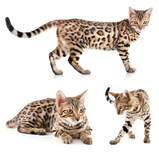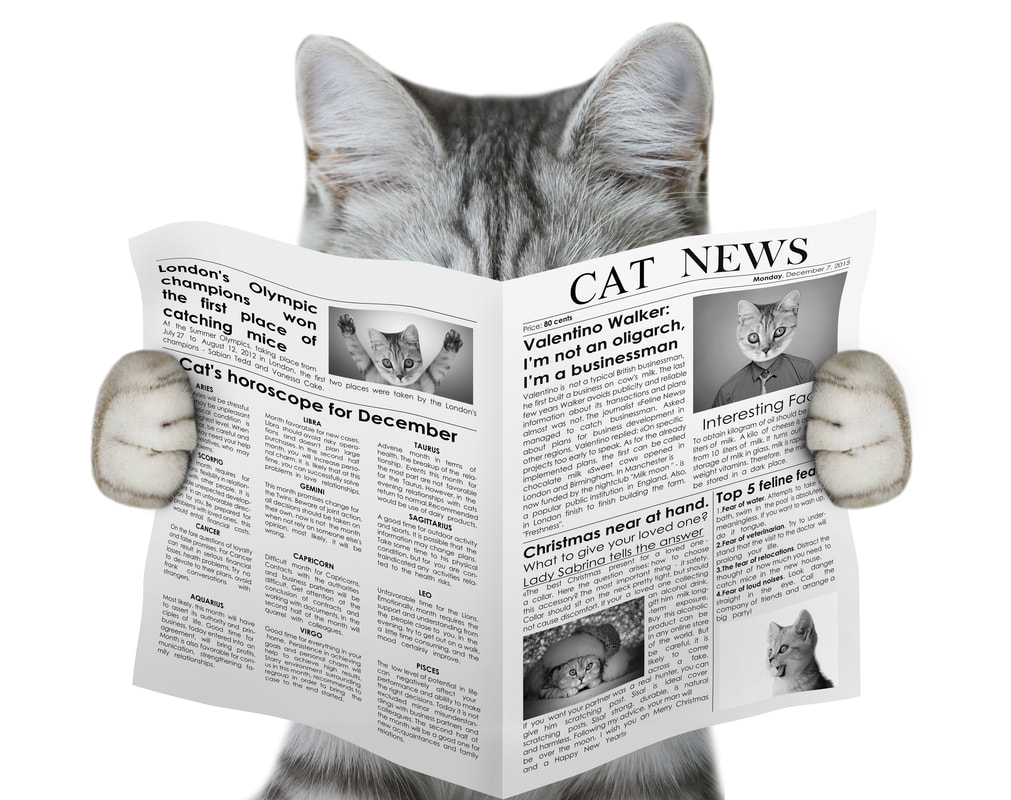 Here are a couple of thoughts on how to introduce a new kitten to your home. The biggest concern regarding kittens in their new home is litter box issues. Kittens are like little toddlers that always need to be close to the potty and don't always realize they have to go until it's too late. Kittens don't have great memories and depth perception initially and can get lost in large environments and can easily forget where the litter box is. Kittens can also be so preoccupied with playing that they forget they have to go and if they can't get to the litter box quickly, then they'll pick the closest corner. Be sure you show your new kitten where the litter boxes are, Don't just expect that they will find them. Approach One: You can allow your kitten the run of the house but keep several litter boxes close by. Using Dr. Elsley's Kitten Attract Litter should also help entice kittens to start using their new litter boxes. Make sure the sides of the litter box are not too high for your young kitten. Over time, after a month or so, you can slowly switch out this litter to an all natural litter. Over time you can slowly move the litter boxes from their close but inconvenient places to their permanent places and even decrease the number of litter boxes as the kitten learns their new home and learn to hold it longer. If litter box problems persist then you can try approach Two. Approach Two: Most literature online refers to approach two. You start the kitten off with a small area and work your way to big. So keep the kitten in a bathroom or small bedroom where they can learn the lay of the land and always be close to a litter box. If at any point in increasing the area the kitten roams that litter box problems creep up again you can either decrease the area again and wait for maturity or increase the litter boxes and go back to Kitten Attract litter. Nails: Expect your kitten's nails to be out more often as they don't learn to sheath them until they're 4-5 months old. A kitten's nails serve as a protective mechanism while they are still young. You can curb this issue by trimming the nails every week or Two. Want to sleep with your kitten? Cats are by nature nocturnal animals. This means that they want to be up all night and sleep all day. Since we are on the opposite schedule, cats try to adapt to us by being awake during the day to be with us but require frequent and long cat naps. Cats can learn to sleep with us at night but sometimes require training. You can have a cat bed next to your bed or on your bed that is a dedicated spot for your kitten. Following a bedtime routine, just like for kids, will help a kitten prepare for bedtime. We even tell our kittens "Good Night!" before turning off the lights. If a kitten wakes you up at night because they want to be active, kick them out of the bedroom. Since cats are social and love to co-sleep, this serves as a time out that will teach them quickly that waking you up is not ok. Keep in mind that you will need to allow the kitten a way to access a litter box as they will probably not be able to last all night without going to the bathroom. As mentioned before, it's not in a cat's nature to sleep all night and they will have to develop the ability to hold off using the litter box for longer than normal times. When you first get your kitten, they may not even be able to sleep with you at night immediately because they may sleep so deeply that they will urinate in their sleep. The only way to know is to try it and then if it doesn't work, hold off and try again when they are a little older. For more information on your new Registered Bengal, Visit us at https://registeredbengals.com.
0 Comments
 There are many Bengal breeders out there but not all of them are in fact TICA registered. Some people will sell Bengals claiming they are purebred registered Bengals without any TICA (The International Cat Association) registered papers. Is it important to get a TICA registered purebred kitten? 1. Some states have laws concerning hybrid pets and in a few states Bengals are included into that category. States address this concern by requiring any Bengal to be registered in an official cat organization so that pedigree is documented and it is a known fact that the Bengal pet is NOT an early generation Bengal, which is illegal in several states. Please refer to www.HybridLaw.com for laws regarding Bengals in various states. 2. TICA also has it's ethical rules concerning its members that all members must sign and adhere by. These rules make sure that ethical breeding is being practiced and protects the rights of the sellers and the buyers. Breeders that are found in violation of these rules can be kicked out of TICA. Thereby being a member in good standing is a good indication that buyer's rights will be honored. 3. People who sell Bengals without TICA registration papers have cut some corners. These Bengals typically will be a lower price and therefore more economically appealing. However, the fact that corners have been cut will give warning signs that you don't know how their breeding practices may have impact the health of the kitten you are getting. There may have been reasons why they could not have acquired TICA registration papers. Either the Bengal is not a purebred or Breeding Rights were not sold and they are illegally breeding out of contract. Sometimes a Breeder will not sell Breeding Rights on particular kittens because of health and/or genetic concerns of the kitten and so you run a risk when you purchase a kitten from a Breeder that don't have TICA registration papers. 4. A TICA Registered Bengal has documentation of all pedigree to it's original ALC (Asian Leopard Cat) mating and thus guarantee the cat as a purebred Why is it important to get a documented purebred Bengal? Bengals have very different social personalities than other breeds. Many people who buy Bengals do so not just for their awesome Leopard looks but also for their outgoing dog-like personalities and intelligence. A Bengal that is not a registered purebred may have other breeds that will alter this famous personality and give a different less-desirable experience. So you don't always know what you're going to get. Purebred Registered Bengals are also known for having less genetic health problems. Mixed Bengals run the risk of health problems associated with other breeds. If you're going to spend the money and invest your heart into a friend that will be around for 15-18 years, isn't it worth it to get a purebred Registered Bengal that will offer the social temperament and good health throughout that time with you If you are interested in buying a Purebred Registered Bengal cat there are many top notch Bengal cat breeders listed online. Bengal cats are a substantial investment with costs for Kittens running from $300 to $1000 for kittens with no registration papers to $1,800 and up to $10,000 for Purebred Registered Bengals.
A Bengal kitten is one of the most exotic breeds of cat that you will ever come across. The uniqueness of their breed lies within their merged bloodlines giving you an animal like no other. A Bengal cat is a cross between a domestic cat and an Asian leopard cat. Bengal cats are a wise choice for people with allergies; their sleek, tightly pelted coat seems to hold less allergens. Allergy sufferers claim that they can tolerate close facial contact with no reactions. To clarify that when the claim is made that the Bengal Cat is hypoallergenic, the dictionary definition of hypoallergenic is "Having a decreased tendency to provoke an allergic reaction", Therefore, we are saying that Bengals are not as likely to cause the same type, or level, of allergic reaction as do many other domestic cats. An important consideration when looking for a breeder of Registered Bengal Cats is whether the breeder offers a guarantee on the kittens health. Most Bengal Breeders will only offer 72 hour guarantees on the kittens that you buy and will require a veterinarian visit during that time period or there is no guarantee. If you have ever tried to make a quick Vet appointment you know that it is practically impossible to get in that quickly in most cases. Look for Bengal Breeders that have a more substantial guarantee. Will they stand behind the health of their kittens for more than 72 hours! Are the Bengal Kittens Veterinarian examined for general well being and are in good health prior to being placed in your home. Will the breeder replace your Bengal if it develops a life-threatening illness and / or hereditary / genetic or congenital defect which would affect this Bengal's quality of life if it dies soon after you purchase it? Is your breeder available to assist you with questions or concerns about your Bengal after the purchase or are you on your own? What most Bengal Buyers want is an uneventful and smooth transition from the breeders home to yours. Look for Bengal Breeders that believe that the kittens are their responsibility for the duration of their lives, thus are always available to assist you with questions or concerns regarding your new feline friend. Take your time and look for Bengal Breeders that offer health guarantees that run to the first year of the Kittens life. These breeders are out there. In most cases unless you are buying your new Bengal kitten as a Breeder with Breeding rights your kitten must be spayed or neutered before most breeders will send your registration papers to you. This is a precaution against people buying the kittens as pets and then breeding them. Buyers will generally need to provide proof in the form of a picture of the receipt for this procedure on your particular cat before they get the registration paperwork. The new Bengal kitten must be leukemia / HIV negative and up to date with shots, tests and vaccinations when it is ready to go to your home. Ask your breeder to provide you with all records of vaccinations that the kitten has had and a schedule of future vaccinations that are still required. The best Bengal Breeders provide a 2 year health guarantee for our Breeder Kittens. and will guarantee breeder kittens to be fertile both male and female. It does no good to buy the best Bengal kitten on the market to start a breeding program with if it is sterile. Be sure that your Bengal Breeder has a well written sales agreement / contract that clearly spells out what is and is not covered and what the breeders and your responsibilities are with reference to your new kitten. Here is a link to a Bengal Buyers checklist that may be helpful. Remember that you are buying a very HIGH QUALITY Bengal Companion, who if properly cared for should provide you with years of devoted love, affection and enjoyment. The Bengal breeder should make the process as smooth and painless as possible, You as a new Bengal Cat owner will need to provide your companion with a life-long commitment of love, appreciation, respect and responsible care. If you want the most beautiful Bengal cat, like the ones you see in magazines; you will find them at Registered Bengals. For more information on Registered Bengal Kittens visit Registered Bengals.  To promote the Bengal cat’s health, we must provide him or her with an optimal environment for their development. Whether they are a pet a show cat or a breeder in a breeding program, all Bengal cats have the same needs:
Prevent diseases, Viruses and Parasites: Another important element for the Bengal cat health is to prevent diseases, viruses and intestinal parasites. Like all breeds of cats, Bengals have certain weaknesses regarding their health. For example, we know that the HCM (heart problem) affects several bloodlines of Bengal cats and other breeds all over the world. Unfortunately, the result is sometimes death. Since this problem is hereditary, it can be avoided most of the time if breeders would have their cats tested before breeding them. Breeders must have their breeding Bengal cats tested for hereditary and viral health problems. This greatly contributes to better health of the entire feline population. If you adopt a Bengal kitten as a companion, these tests will never be required unless your kitten is sick. So it’s best to choose a reputable breeder; it will save you a lot of hassle. At Registered Bengals, health is a priority. We do everything we can to keep our Bengal cats and kittens as healthy as possible. All Bengal kittens adopted from our cattery come with a complete health guarantee. We (Registered Bengals) work hard to insure that none of our cats or kittens have any of the following diseases and parasites :
How is the presence of these diseases or parasites detected? The Pk-Def (anemia) and PRA-b (progressive retinal atrophy of the eyes) tests are done genetically in a laboratory. You only need to take a saliva sample from your cat on a cotton swab and send it to UC Davis Genetics Laboratory for an analysis. It is the same way that we test the Bengal cat color genes. Other diseases such as FIV/FeLV (Immunodeficiency/Leukemia) are viral and sometimes fatal. The test is done by taking a blood sample at your veterinary clinic. Intestinal parasites (tritrichomonas, giardia, coccidiosis, etc.) are also viral. The test called PCR is done with a stool analysis in a laboratory, through your veterinarian. HCM in Bengal cats is only detectable by a specialized cardiologist who performs a cardiac ultrasound. Here is a summary of these diseases, viruses and intestinal parasites common in cats and specifically Bengal cats. FELINE IMMUNODEFICIENCY VIRUS (FIV): The feline immunodeficiency virus (FIV) causes the body the inability to develop a normal immune response. Because of this immunodeficiency, most infected Bengal cats are prone to developing certain types of cancers and other infections that affect their health. Although it is a virus, some cats have no symptoms and have a normal life expectancy. FELINE INFECTIOUS PERITONITIS (FIP): Feline infectious peritonitis (FIP) is a viral disease that affects the health of Bengals and other domestic cats. It is caused by a mutation of a virus called coronavirus, which tends to attack the cells of the intestinal wall. FIP manifests in both “wet” and “dry” form. Signs of both forms include fever, anorexia, weight loss and lethargy. Fortunately, this serious health problem is very rare, only 3% of coronavirus positive cats will develop the FIP. 10 to 40% of cats carry the coronavirus in them. It is important to specify that the coronavirus alone is not problematic; it only is when it mutates into FIP. Do not mix the two scenarios. Many cats that have the coronavirus are asymptomatic. FELINE LEUKEMIA VIRUS INFECTION (FELV): Feline leukemia virus (FeLV) is a disease that attacks the health of Bengal cats by altering the immune system and causing certain types of cancer. This viral infection is responsible for the majority of deaths in domestic cats, affecting all breeds. Although it is a virus, some cats with this virus have no symptoms and have a normal life expectancy. TRITRICHOMONAS FOETUS INFECTION IN CATS: Trichomonas foetus (T. foetus) is a unicellular protozoan that lives in the colon of Bengal cats. The symptoms are diarrhea and long-lasting smelly stools, sometimes mixed with blood or mucus. This health problem is viral and is transmitted by stool. It affects kittens much more strongly than adult Bengal cats. PYRUVATE KINASE DEFICIENCY (PK-DEF): Pyruvate kinase deficiency is an inherited health issue in Bengal cats. Pyruvate kinase is an important red blood cell enzyme in the energy metabolism of red blood cells. Therefore, if this enzyme is lacking, anemia may result. This health problem is inherited as a recessive gene, so only cats with two copies of the defective gene will have their health affected. Carrier Bengal cats are clinically healthy, but can transmit the defective gene to their offspring. GIARDIA PARASITIC INFECTION IN CATS: is an intestinal infection caused by the protozoan parasite called giardia. This parasite can also affect the health of humans and other animals. Contamination can come from direct or indirect contact with the infected Bengal cat. The infected cat will usually have a soft, greasy diarrhea with a strong smell, sometimes accompanied by excessive mucus. BENGAL PROGRESSIVE RETINAL ATROPHY (PRA-B): The Bengal progressive retinal atrophy (PRA-b) causes recessive blindness in Bengal cats. This inherited disease attacks the health of the eyes and causes the destruction of cells that record light. The loss of cells begins around the age of 7 weeks and progresses slowly until the cat vision becomes compromised around the age of 2 years. However, blindness can develop at different rates. HYPERTROPHIC CARDIOMYOPATHY (HCM): Hypertrophic cardiomyopathy (HCM) is a fairly common inherited cardiac condition which affects the Bengal cats health. The heart muscle thickens, so the organ has to work much harder, causing several health problems. Blood clots or thrombosis can ensue, making the back legs motionless. This important health problem can also lead to heart failure, resulting in death. The first signs of cardiomyopathy include shortness of breath and excessive fatigue in Bengal cats. COCCIDIOSIS PARASITIC INFECTION IN CATS: Coccidiosis is a parasitic infection caused by the parasite Coccidia. Coccidiosis is particularly dangerous for the health of kittens because their immune system is still underdeveloped. The infected Bengal cat will usually have the following symptoms: watery, bloody or mucous diarrhea, weakness and fever, vomiting, weight loss and dehydration. This health problem is viral in Bengal cats. FELINE HERPESVIRUS INFECTION OR FELINE VIRAL RHINOTRACHEITIS IN CATS: Feline viral rhinotracheitis (FVR) is an infectious disease caused by a feline herpes virus. This virus attacks the health of the Bengal cat by causing infections in the upper respiratory area, nose and eyes. It can infect cats of all ages, but it is more common in kittens because they have a weak immune system. The most common symptoms of an infected Bengal cat are sneezing, runny nose, eye discharge and conjunctivitis. This virus is extremely viral and is transmitted by direct or indirect contact between cats. It’s enough for one cat to sneeze near another, and the damage is done. A cat can also develop it after experiencing physical or psychological stress. There are different opinions among Bengal breeders and veterinarians about what testing should be done and what vaccinations are necessary. Consult your veterinarian for their opinion and the specific requirements where you live. For more information on Bengal cats, Becoming a Bengal Breeder or cat information in general visit RegisteredBengals.com.  Some important guidelines when searching for your Bengal cat or Bengal kitten, buying a Bengal kitten is a costly investment. Be sure you choose the right breeder. These are the important questions to ask your Bengal breeder: Ask these questions and put a check mark next to each one that the breeder does. Bengal cats have a few more health problems than some of the other cat breeds and testing is needed to ensure you get a healthy cat. If a breeder does not do these tests you risk getting a cat which will have health issues or possibly even die early. If the breeder does not want to answer these questions, you should find another breeder. The Bengal cat price should not be your only consideration. You could spend thousands in veterinarian care and testing if you purchase from the wrong breeder.
*A health guarantee should never be a substitute for testing; what good is a health guarantee if your beloved pet dies because the breeder would not test the breeding cats? In most cases you will be offered a cat as a replacement, but how can a replacement take the place of your pet? As a rule, you should buy from breeders who test their adult breeders for PK Deficiency, FeLV, PRA and who also have a consistent worming and flea protocol. If you can check off each one of these things on this list, it is a good bet you will have a healthy Bengal. All reputable breeders have a contract between the buyer and the seller of the kitten. When you get your Bengal, you must realize that we have a large investment in your new kitten. The investment is not only monetary - a reputable breeder cares for kittens even after they are placed. Also when a breeder has a TICA registered cattery there are standards for health and cat care which must be adhered to. The contract is a legal document which spells out how you must treat your Bengal, and what penalties apply if you violate the agreement. The contract also provides you with some important health guarantees. Your Friends at Registeredbengals.com  Bengal cats are a beautiful and muscular breed. They make excellent pets and are thought by many to be Hypoallergenic. Meaning that if you are allergic to cats you are less likely to be allergic to this particular species. Because of the leopard like appearance many people associate them with Wild cats but they are generally very social and adapt well to home life, provided they are kept stimulated. Bengal cats are very active and athletic and require lots of stimulation to keep them occupied. Bengals tend to be very social and are not shy about communicating their needs by vocalizing when they need to. Every cat is an individual but in general Bengals make excellent house pets and get along well with other pets in the home. They are best suited to homes with older children that will enjoy playing with them With proper care and nutrition you can expect your Bengal cat to live for 14 to 16 years. Because of the popularity of Bengal cats and the high cost it is highly recommended that you always keep your Bengal indoors on on a leash with you if you plan to walk them. Bengals are naturally curious and many will play in water if it is available. Bengals are a cross between a wild Asian leopard cat and a domestic cat. Bengals are very smart and have long memories so treat them right because they will remember either way. Bengals are great jumpers and climbers and can jump up to three times their height. Overall Bengals are gentle, intelligent cats and make excellent pets. |
Registered Bengals
We raise quality TICA & CFA Registered Purebred Bengal Kittens in our home in Beautiful, Kalama, Wa. Archives
April 2020
Categories
All
Blog Titles:
|
If you are visiting our site Registeredbengals.com from a Mobile device you may have a better experience visiting our
other Page Bengaltimecattery.com. The content is exactly the same but the pages will display
in "Desktop mode" which should make for a better browsing experience.
other Page Bengaltimecattery.com. The content is exactly the same but the pages will display
in "Desktop mode" which should make for a better browsing experience.
Your positive reviews and comments on the sites above would be appreciated.
If we did not meet your expectations please contact us
and give us an opportunity to make it right.
If we did not meet your expectations please contact us
and give us an opportunity to make it right.
|
Lyubov & Andy 503-484-3033 [email protected] Registered Bengals / Bengaltime Cattery Verified / Reputable Bengal Breeders Kalama, Washington |
Site Updated 12/10/24
|
2019 / 2020
CFA Bengal Breed Council Member. |
|
©2016 - ©2024 by Registered Bengals - Washington State Bengal Breeder
Schedule an appointment to come visit your kitten you can see your kitten by facetime almost anytime. Shipping and or personal delivery available (To Bookmark this page use "Control D" Windows or "Command D" Mac) |
Bengal kittens for sale, Bengal kittens available, Hypoallergenic cats, Bengal colors and patterns, Bengal Stud Service, Registered Bengals, Bengal Time, Bengal kittens in Oregon, Bengal kittens in Portland, Bengal kittens in Washington, Bengal kittens in Seattle, Bengal kittens in Spokane, Seattle Bengals, Bengal cats in California, Bengal cats near me, West coast Bengal cats, Bengal BLOG, Bengal kitten prices, How much is a bengal kitten, Bengal cat health issues, Best Bengal kitten breeders, Bengal Health Guarantee, Bengal cattery, Cattery, Bengal, Bengal Yelp Reviews, #available #bengal #bengal cat #bengal kitten #bengals #bengals nation #bengals of instagram #bengal cat lovers #bengal world #bengal breed #kittens #kittens of instagram, leopards #living room leopard #cats #phenomenal kittens #fabulous pets #TICA #CFA #Bengaltime #Registered Bengals #Cattery #Kittens near me #Lap Leopards #lil Leopards #Bengals near me #Bengal Bengal Kittens in Idaho, Bengal kittens in Utah, Bengal Kittens in the Pacific Northwest, Bengal Adoption, Adult Bengal cats, Bengals for sale to breeders, Bengal Health issues, Best cats, Most expensive cats, make money breeding Bengals, Bengal products, Bengal Pictures, Kitten Pictures, Cat products, Cat Vitamins, Raw feeding, Cattery, Breeder, Tica. CFA, The International Cat Association, Cat Fanciers of America, Hypoallergenic, For Sale,Best Christmas Gift, New Years Gift, Birthday Gift, Gifts for Her, Bengal Cats,Verified Bengal Breeder,VBB, The international Bengal Cat Society, TIBCS, Emotional support kittens, ESA, Emotional support cats, Reputable Breeder, HCM Tested, DNA Tested, You are the best Bengal Breeders















 RSS Feed
RSS Feed































